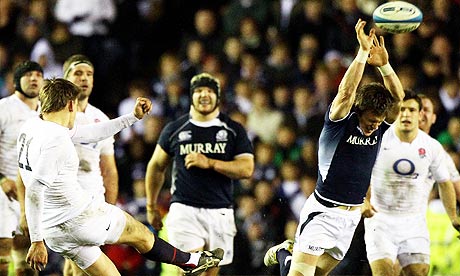
A bruising 15-all draw at Murrayfield withdrew England from the Six Nations title race, while Ireland kept their hopes alive with a comfortable home victory over Wales. France, the unbeaten favourites, play Italy today at the Stade de France.
Penalties and a drop goal were the order of the day in Scotland. There was not a try scored in the Calcutta Cup encounter, which is not so very rare, given it has happened three times in a row now in Edinburgh. Jonny Wilkinson, knocked out in a collision with Max Evans and his own captain, Steve Borthwick, wobbled away from the action, which is not so very rare either. He was not the only player knocked senseless, for Ugo Monye and Kelly Brown clashed heads and both had to leave the field, England's wing on a stretcher. This was an advert for rugby as combat rather than entertainment.
Alastair Kellock was laid out too, but having received attention near the half-way line he recovered and stood up to find the ball coming his way out of the evening sky. He proved his fitness to continue by making a catch and smoothly passing the ball on.
Both teams had chances to win the game, but Toby Flood was short with a long penalty and wayward with a drop-goal attempt at the very end. Dan Parks hit the post twice with long-range penalties. It was simply tough all round, wrecking-ball rugby that was painful in every sense.
At least there were tries in Dublin as Ireland, 27-12 winners, did to Wales at home what they had done to England at Twickenham, remaining at ease when without the ball and striking every time a chance with it came their way.
It was the day when Brian O'Driscoll won his 100th cap, and seemed ready-made for a special performance from the leader of Ireland's golden generation. The captain made a mark or two with his tackling and was involved in the passing for Ireland's first try, but it was two of the younger brigade who stole the show. Keith Earls scored two tries, the other coming from the real star turn, Tomas O'Leary, who directed the defensive and offensive operations with precision.
Just as influential was Paul O'Connell who stole several throws on the Welsh line-out and made emphatic gains with his runs in open play. Nothing had stuck in his hands in earlier rounds, but here he caught everything bar one late restart and galloped into space. His offload to his scrum-half for Ireland's second try was a sweet touch of class.
There was nothing sweet about the Welsh performance, only a repetition of the bad bits of previous rounds without the counterbalancing beauty of a comeback. An echo of the defeat at Twickenham was provided when they lost Lee Byrne to the sin-bin in the first half and immediately leaked two tries.
At least there were no interception tries, the Welsh downfall against France. In fact, here at Croke Park they now had a chance to overcome a half-time deficit smaller than those they had faced before. Against England, Scotland and France they had trailed after 45 minutes by 17, 12 and 20 points respectively. Yesterday they trailed by 10, but having worked their way to within five metres of the Irish line not long into the second period they lost a scrum against the head and the spark seemed to go out of their revival. The longer the game went on the less progress the vaunted Welsh attack made.
The line-out improved but the three-quarters drifted across the field and no clear breaks were made. Jamie Roberts had made some gains with his runs in the first half, but was halted in the second, and without any thrust in the centre, Wales became more and more careless with the ball.
Ireland defended stoutly and then struck, with a penalty, Earls's second try and a drop goal by Jonathan Sexton. If the outside half had kicked with anything approaching his customary accuracy – he landed only three place-kicks from seven attempts – the winning margin would have been a gulf.
England have lost once, to Ireland, and this draw means that only Ireland or France can take the title. France play England on Saturday in Paris, while Ireland hope to complete the Triple Crown by beating Scotland in Dublin. This will be the last game they play at Croke Park, their home for the past four seasons while Lansdowne Road is being rebuilt.
Wales face Italy in Cardiff, a match to determine where the wooden spoon will go. This is not exactly what Wales had in mind as they entertained serious hopes of their own only eight weeks ago. The inquest into what went wrong in Dublin is likely to be bitter and prolonged. Such is the way in Wales.
England are likely to be too dented to be doing much more than recover over the next few days. The only talking point they have generated in the championship concerns the physical toll of modern international rugby. You could tell by the way that Dr James Robson, the Scottish team doctor, ran repeatedly and urgently on to the field that something decidedly dangerous was going on before his very eyes.

